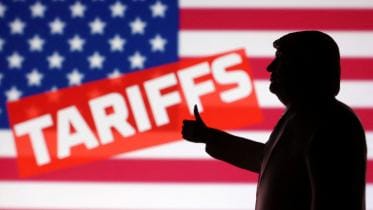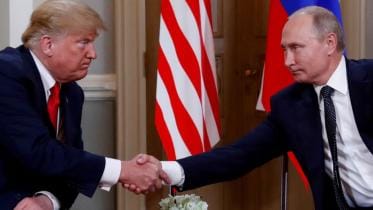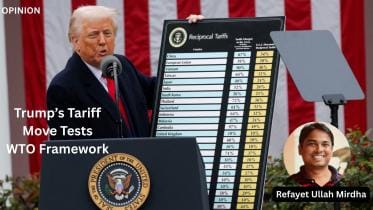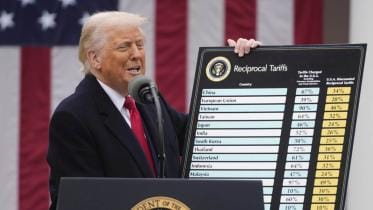Trump tariff
Bangladesh risks $1.25b export loss to US over tariffs
RAPID study show
16 September 2025, 18:00 PM
US may further cut tariffs if trade gap narrows
The Trump administration may reduce the reciprocal tariff on Bangladeshi goods further from the current 20 percent if the trade gap between the two countries narrows, Commerce Adviser Sk Bashir Uddin said yesterday.
14 September 2025, 18:00 PM
Bangladesh suspends US-bound postal parcels as new tariffs bite
The change has left thousands of small businesses and families struggling to send packages to America
14 September 2025, 18:00 PM
Stop buying Russian oil
President Donald Trump yesterday said that the United States is prepared to impose fresh energy sanctions on Russia, but only if all Nato nations cease purchasing Russian oil and implement similar measures.
13 September 2025, 18:07 PM
Trump urges EU to impose 100% tariffs on China, India to pressure Putin
US President Donald Trump urged EU officials on Tuesday to hit China with tariffs of up to 100 percent as part of a strategy to pressure Russian President Vladimir Putin, according to a US official and an EU diplomat.
10 September 2025, 18:00 PM
Trump offers tariff relief to some trade partners
US President Donald Trump signed an executive order offering some tariff exemptions as soon as Monday to trading partners who strike deals on industrial exports such as nickel, gold and other metals, as well as pharmaceutical compounds and chemicals.
7 September 2025, 18:00 PM
How Trump’s reciprocal tariff challenged WTO’s multilateral trading system
Bangladesh is in an advantageous position compared with competing countries in the US
20 August 2025, 02:00 AM
Tariff math favours Bangladesh in shifting US trade landscape
The shift of the USA to reciprocal tariffs has shaken global trade. But for Bangladesh, it’s opened a rare window of opportunity
8 August 2025, 18:00 PM
Trump tariffs on Russia's oil buyers bring economic, political risks
With a Friday deadline for Russia to agree to peace in Ukraine or have its oil customers face secondary tariffs, Trump has found a novel, but risky, use for his favorite trade tool.
8 August 2025, 05:49 AM
Bangladesh hopes to set sail stronger as US tariff kicks in
The new tariff on US-bound exports from Bangladesh came into effect yesterday, with hopes of maintaining a healthy flow of garment shipments to the American market.
7 August 2025, 18:35 PM
Higher US tariffs take effect on dozens of economies
US duties rose from 10 percent to levels between 15 percent and 41 percent for a list of trading partners
7 August 2025, 04:15 AM
India-US spat over trade and oil threatens wider fallout
India is already making some moves with Russia and China. Modi is set to visit China soon for the first time since 2018.
7 August 2025, 01:34 AM
US reciprocal tariff taking effect tonight
The new 20 percent reciprocal tariff by the United States on Bangladeshi exports to the American market will come into effect tonight, which may open up opportunities for the country’s apparel sector as it adapts to evolving global trade dynamics.
6 August 2025, 18:00 PM
What if India and China stop buying Russian oil?
Donald Trump is tightening sanctions loopholes that fund Moscow's war machine. What does a crackdown on Russia's oil trade mean for global markets — and economic heavyweights like China and India?
6 August 2025, 16:56 PM
How India-US trade talks collapsed
New Delhi is now left with the surprise imposition of a 25% tariff on Indian goods from Friday
6 August 2025, 04:20 AM
India hits back at Trump’s threat
India’s ruling party and main opposition yesterday condemned a threat by US President Donald Trump to raise tariffs on goods from India over its Russian oil purchases, in a show of political unity as a trade rift deepens with Washington.
5 August 2025, 18:00 PM
New Trump tariffs: early modelling shows most economies lose – the US more than many
The tariffs will compel foreign producers to lower their prices. But these price decreases only partially offset the cost of the tariffs, so US consumers pay higher prices.
4 August 2025, 06:14 AM
US retailers lean on suppliers to absorb tariffs
Rather than absorbing the cost or immediately passing it on to consumers, many US apparel retailers and brands have turned to their suppliers in Bangladesh, demanding they share the pain
3 August 2025, 18:20 PM
Effective tariff for RMG exports to US climbs to 36.5%: BGMEA
The tariff will be a bit less if 20% of the cotton used in garment production is sourced from the USA
2 August 2025, 10:13 AM
World economies reel from Trump's tariffs punch
Trump announced late Thursday that dozens of economies, including the European Union, will face new tariff rates of between 10 and 41 percent.
2 August 2025, 03:47 AM
















